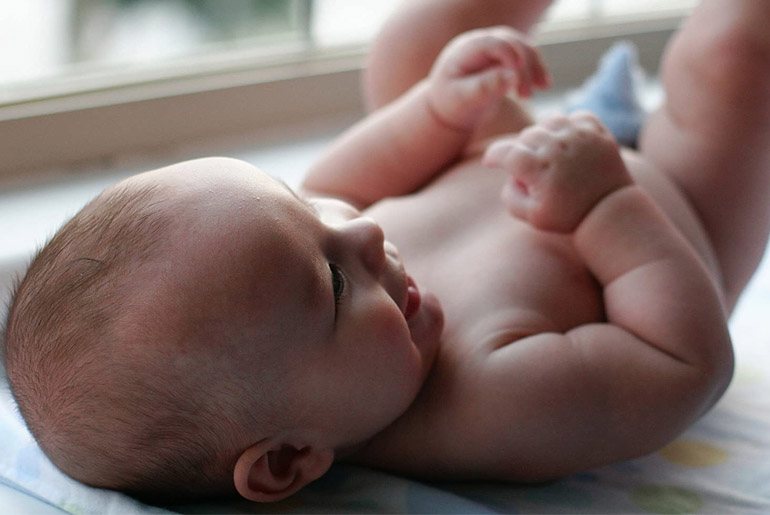Disclaimer: There are affiliate links in this post. At no cost to you, I get commissions for purchases made through these links.
One of the most enjoyable experiences as a parent is having your baby pee on you during a diaper change. However, this phenomenon can cause fatigue and discomfort if repeated for a long time.
So, how to avoid getting peed on by your baby boy? Through this article, let’s explore ways to keep yourself clean and dry.
Why Do Babies Pee When Changing Diapers?
Baby boys often pee during diaper changes because of the cold air. When it affects the lower abdomen, your baby will feel the need to urinate. When the body is suddenly cold, it will tend to excrete excess water in the body to keep warm. Your baby boy is no exception to this.
Children cannot manage their reflexes. When they feel the need to urinate, nothing can stop them. When undressing, your boy baby will inevitably be exposed to cold air. It will irritate the child’s bladder and cause them to squirt water at the diaper changer.
In addition, the baby’s preferences can also be a significant reason. It can be complicated to understand when your boy is just a kid. Besides, you also need to pay attention to the natural ability of boys to urinate.
As they get older, they tend to hold some urine through the night and will need to urinate in the morning. If you want to change diapers at this time, consider that because it can lead to a wet morning.
Instead, consider changing diapers before your baby sleeps or finding a way to get them to pee before bed. These actions will somewhat reduce the feeling of needing to urinate when the baby wakes up.
Ways to Stop Your Baby Boy from Peeing On You During Diaper Changes
These ways and tips are effortless, and you can immediately apply them not to get peed on by your baby boy.
1. Change Quickly
The first and most straightforward method is to speed up diaper changes for your boy. You must try to perform operations as quickly as possible. It’s tough if you are not familiar with these operations. New parents are often slower and more confused at first because everything is so strange.
One tip to save time is to prepare the equipment in advance. Make sure wipes, new diapers, and other supplies are within easy reach when needed.
The recommended practice is to place the diaper underneath the baby and remove the old nappy as quickly as possible. This method saves time and is highly effective.

2. Make Your Baby Pee First
Some parents use the cold air method or the cold trigger trick. They believe that being proactive will have more advantages in the diaper change process.
The technique of this method is to encourage the baby to pee before the diaper change is started. Try to let cold air contact your baby’s lower abdomen and stimulate them.
You can apply the following methods for testing:
- Open the diaper and reveal a gap in the baby’s lower abdomen. Cool air will enter this area.
- If your room is warm, try creating it with a paper fan.
- Another method you can apply is to take a cold towel and rub it on the baby’s skin. Place the wet wipes in the freezer for about a minute, then place them under the edge of the diaper.
Make sure you don’t use a towel that is too cold or blow too much air into the lower abdomen of your baby. Don’t let your baby get cold or upset.
3. Keep Everything Warm
If you don’t want to make your baby cold, try the opposite. Keep things around your baby as warm as possible to prevent the urge to urinate.
Choose the warmest places in the house, like the bedroom or next to the living room fireplace. Start undressing the child in this area quickly.
Besides, you should also learn how to warm the baby’s body wipes before wiping and cleaning. There are two methods for warming wipes, including:
- Use a wipe warmer.
- Place the warm washcloth in your hand and let it stay in contact with your baby’s skin throughout the undressing process. This process helps the baby to avoid temperature shock and stay warm.
Temperature is an important factor that you need to pay attention to. Do not overheat the wipes. The baby’s skin is very fragile so it can burn at any time. Feeling pain also makes them fussy and uncomfortable.

4. Examine The Visual Cues
If you pay attention to your baby’s gestures, you’ll be able to pick up on some things quickly. Children often try to inform their parents about their physical condition in advance.
Some of the telltale signs that you can recognize with the naked eye include:
- Babies may make specific noises or sounds if they need to urinate.
- Baby’s penis sticks out right when they want to pee. So, pay attention to this sign.
- In addition, your baby may cry or make grimaces when urinating.
- Finally, pay attention to diapers. If the diaper is drier than usual, your son will wet it soon after.
If you recognize one of these signs, play it safe and keep everything in place. After the boy has finished peeing, continue with your work and make sure you keep yourself dry. Sometimes, the baby won’t leave too many signs to the parents. However, as its parents, many people can still perceive strange things.
The point here is that you need to pay attention to your baby’s gestures and react as quickly as possible. Be prepared with equipment to not be passive in different situations.
5. Use Pee Guards
Last but not least, try using the pee shields on the market. Basically, this little device is shaped like a party hat to cover the penis and prevent urine from leaking all over the place.
This piece of fabric is highly absorbent. In addition, you can wash it to reuse it at any time. They are not the optimal choice for most parents to avoid a baby boy peeing on them.
After using this, parents commented that its use is not too different from regular cloth. So, consider buying pee guards as they take up your budget.
Conclusion
To summarize how to keep your baby boy from peeing on you, you can apply one of the following methods:
- Try changing diapers as quickly as possible.
- Encourage your baby to pee before going topless.
- Keep the space around the child’s body warm.
- Check out some signs.
- Use pee shields.
Applying these methods can minimize the chance of you and the furniture around you getting covered in urine. In that situation, stay calm and find a way to clean things up. Your emotions can easily influence babies, so don’t make them feel scared.
Over time, the condition will slowly subside and disappear. The key to overcoming is love and patience.



